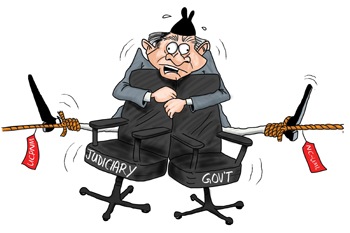Nepal’s political players should finally learn that the only way to reduce outside interference is to put our own house in order

DIWAKAR CHETTRI
You may call it the ‘little country syndrome’. Small states situated among larger neighbours tend to have an exaggerated sense of their own importance, and think that other countries are competing to gobble them up.
At the time Prithvi Narayan Shah made his famous reference to Nepal being a sweet potato between two boulders, the nation he unified was three times bigger than it is today. We are still a yam, but a much smaller one. Fast forward to Maoist Chairman Pushpa Kamal Dahal who once got so carried away he made the suicide-bomber statement that Nepal could be “a dynamite between two boulders”.
Dahal was trying to threaten the big neighbours to take him more seriously. He repeatedly failed to learn from the mistakes of his predecessors that playing India off against China doesn’t work. It never did. Even in the cold war years of the mid-1960s just after China and India fought a bloody Himalayan conflict, Mao Zedong had a clear message to a visiting Nepali prime minister: “Tell your king: keep India happy
and find your space.”
After his last visit to China in April, Dahal came back with the sobering message that the Chinese had told him to “sort it out with India”. Finally, the Chairman seems to have got the message that he shouldn’t try to disturb the status quo in trans-Himalayan relations.
It’s time other Nepali leaders also stopped rocking the boat, and developed a more realistic sense of Nepal’s geo-strategic importance. No one really has an overwhelming urge to interfere in Nepal’s internal affairs. Not since 1792 and 1816 have we waged war against our neighbours. Nepal does not have vast oil and gas reserves, there are no important sea lanes here, and there is no competition over our water resources because it is useful only to downstream states. The national interests of India and China converge on Nepal because both want political stability, but perhaps for different reasons. The last thing both want is for Nepal to become a bundle of dynamite with a timer attached.
Contrary to what Nepal’s conspiracy obsessed politicos think, foreign policy mandarins in Beijing and New Delhi are not spending all their working hours thinking about how to interfere in Nepal. They have other concerns. Despite their size, both are extremely sensitive about separatist movements and insurgencies within their own borders. China has territorial issues in the East China Sea, North Korea and Taiwan, and India has its hands full with a pesky neighbourhood, and making its presence felt in the larger world stage.
Both countries are in a race against time to maintain economic growth so that their vast populations have jobs, and China in fact is India’s largest trading partner. Neither wants the tectonic distractions of an unstable Himalaya. The spheres of influence between our neighbours, and Nepal’s place in it, are fairly well-established and neither wants to
shake it up.
When they do think about Nepal, our neighbours probably worry about us not being worried about our future. This week marks the first anniversary of the dissolution of the Constituent Assembly: a symbol of the spectacular failure of our politics. But there is also relief in many quarters that the constitution would have led to fragmentation and chaos. When the political parties failed to agree on an electoral government, the international community backed the plan to make the Chief Justice the prime minister.
It is now clear that the chief justice is just a puppet, he is beholden to the forces that gave him the post. Foreign friends behind this formula say they acted out of desperation, but they should ask themselves: does the systematic dismantling of democratic institutions make Nepal more stable?
Nepal’s political players should finally learn that the only way to reduce outside interference is to put our own house in order. Our future is trade and investment, Nepal will benefit from hitching its wagons to the twin China-India locomotive, not by decoupling ourselves from them.
Read also:
The Great Unifier
The great game
“We don’t need international approval for everything”